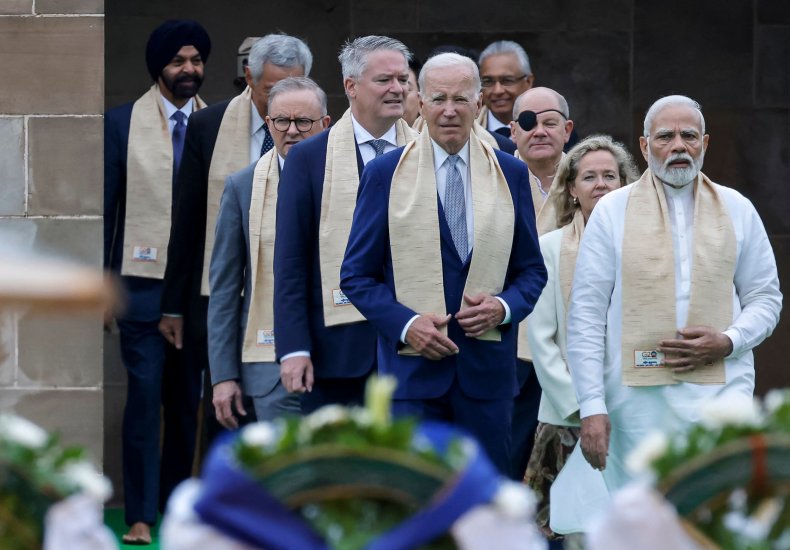DANISH MANZOOR
A landmark move to counter China's growing influence and boost global infrastructure development has been announced at the G20 summit.
Indian Prime Minister Narendra Modi and U.S. President Joe Biden co-chaired a special event on the Partnership for Global Infrastructure and Investment (PGII) and the India-Middle East-Europe Economic Corridor (IMEC) on September 9, 2023, during the summit in New Delhi, India. The event was attended by leaders from the EU, France, Germany, Italy, Mauritius, the UAE, Saudi Arabia, and the World Bank.
The PGII is an initiative designed to bridge the infrastructure gap in developing countries and accelerate progress towards global sustainable development goals. The IMEC, on the other hand, consists of an eastern corridor connecting India to the Arabian Gulf region and a northern corridor connecting the Gulf to Europe, including a railway and ship-rail transit network and road transport routes.

U.S. President Joe Biden (center) and Indian Prime Minister Narendra Modi (right) with world leaders at the G20 summit in New Delhi, India, on September 10, 2023. A historic project to counter Chinese influence was unveiled at the summit.
This historic initiative represents a strategic effort by the participating nations to strengthen economic ties and foster development across Asia, the Middle East and Europe. Those involved say it is a collective move toward creating an integrated and sustainable global economy centered on clean energy, digital connectivity, and secure supply chains.
Importantly, it also poses a direct challenge to China's Belt and Road Initiative (BRI) by providing countries in the region with an alternative for infrastructure development and economic cooperation. Additionally, it embodies a shared vision among the participating nations for an open, secure and prosperous future, which could be interpreted as a strategic effort to counterbalance China's expanding influence in the region.
Modi emphasized the importance of physical, digital, and financial connectivity in his remarks, noting that the IMEC would facilitate economic integration between India and Europe. "Charting a journey of shared aspirations and dreams, the India-Middle East-Europe Economic Corridor promises to be a beacon of cooperation, innovation and shared progress," he posted on X, formerly Twitter.
"As history unfolds, may this corridor be a testament to human endeavor and unity across continents."
A White House communiqué elaborated on the initiative, stating, "Today, we the leaders of the United States, India, Saudi Arabia, the United Arab Emirates, France, Germany, Italy, and the European Union announced a memorandum of understanding committing to work together to develop a new India-Middle East-Europe Economic Corridor. Through the India-Middle East-Europe Economic Corridor, we aim to usher in a new era of connectivity with a railway, linked through ports connecting Europe, the Middle East and Asia."
The communiqué highlighted the goals of linking both continents to commercial hubs, facilitating the development and export of clean energy, expanding reliable access to electricity, enabling advanced clean energy technology innovation, and connecting communities to secure and stable internet.
It also underscored the intention to drive existing trade and manufacturing, strengthen food security and supply chains, unlock new investments from partners, including the private sector, and spur the creation of quality jobs. It concluded by reaffirming the U.S.' commitment to pursuing transformative regional investments and building the corridor in collaboration with its partners.
The memorandum of understanding on the IMEC was signed by India, the U.S., Saudi Arabia, UAE, European Union, Italy, France and Germany, solidifying their commitment to work collectively and expediently to arrange and implement the new transit routes.
The initiative not only signifies a strategic move towards strengthening global economic ties and development, but also represents a crucial countermeasure to China's increasing influence in the region.
A Closer Look at the China Factor
China's Belt and Road Initiative has several negative implications for the U.S. and India:
Geostrategic Influence
The BRI enhances China's geostrategic influence across Asia, Africa, and Europe, which could potentially undermine U.S. influence in these regions. For India, it increases Chinese influence in its immediate neighborhood and along its borders, raising concerns of strategic encirclement.
Economic Influence
By providing funding for infrastructure projects, China gains significant economic influence over countries participating in the BRI. This could lead to a decline in the economic influence of the U.S. and India in these regions.
Debt Diplomacy
There are concerns that countries participating in the BRI could fall into a debt trap, leading to increased Chinese influence over their domestic and foreign policies. This is concerning for both the U.S. and India, as it could lead to a decline in their influence over these countries.
Security Concerns
For India, the BRI also has security implications, as some of the projects pass through disputed territories like the China-Pakistan economic corridor through Pakistan-occupied Kashmir.
Military Access
The development of ports and other infrastructure could potentially be used by the Chinese navy, posing a security threat to both the U.S. and India.
Economic Competition
The BRI also poses economic challenges as it enhances China's access to markets and raw materials, potentially at the expense of the U.S. and India
No comments:
Post a Comment